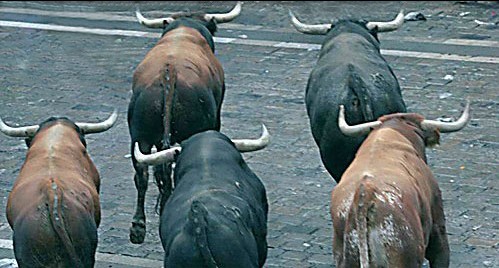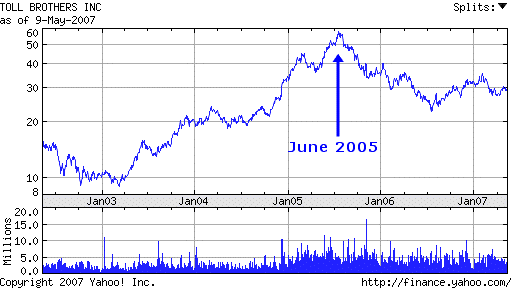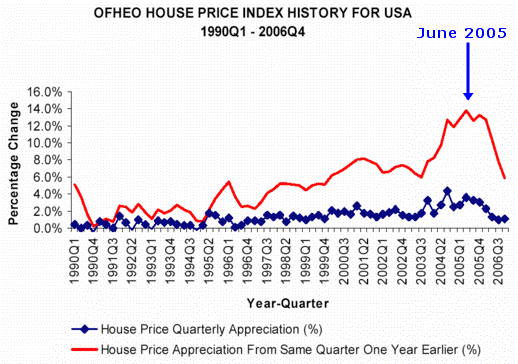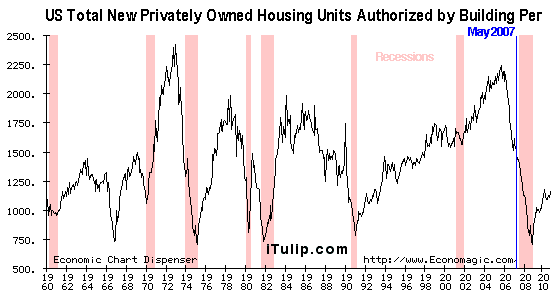 |
May 10, 2007 (Madlen Read, AP Business Writer)
Stocks Decline After Disappointing Retail Reports, Widening Trade Deficit
NEW YORK (AP) -- Wall Street retreated sharply Thursday, slicing more than 100 points off the Dow Jones industrials after weak sales at many of the nation's major retailers heightened concerns about consumer spending.
Companies including Wal-Mart Stores Inc., J.C. Penney Co. and Federated Department Stores Inc. said business fell in April, hurt by rising gasoline prices. Though many retailer stocks fared decently Thursday, the reports raised worries that retail sales data from the Commerce Department Friday will suggest that the economy is slower than previously thought.
AntiSpin: Retailers disappoint but don't blame the weather? What next? Honest reporting of inflation and unemployment data? Call today The Running (Away) of the Bulls. If you are a bull, you can blame today's market action on long term bear Richard Russell who just threw in the towel to join you. Just kidding. No, the cause is the lag time between the housing price declines and a reduction in consumer spending. Time's up! And time to pull out the iTulip January 2005 housing bubble correction prediction to see where we're at in the housing bubble collapse process. We called a housing top in June 2005, so by our own estimates we're now just about two years into it. The prediction says that after two years, we enter Step C: Consumers take a long vacation.

Step C: After prices have declined for two years, large numbers of buyers who purchased near the top of the market will begin to feel the psychological effects of being underwater on their mortgage. They will be less inclined to borrow money, or to spend money fixing up their home, as home improvement value increases will be swallowed up by general market price declines. There will still be profits to be made by those who bought very early in the previous boom cycle, but fewer people will have this option.
As transaction volumes continue to fall, demand for housing-related employment will decline too. The first signs of labor market distress will start to show up, as more and more of that 43% of the private sector who found jobs in the housing industry are no longer needed. Coincidentally, major employers—such as the U.S. auto industry—will be going through major restructuring, adding to pressures on housing prices in some areas. Some home owners will need to sell at a loss in order to move to regions of the country where the labor picture is better, and will do this if they have enough equity and are not paying cash out of pocket to cover their remaining mortgage obligations. These sales will further depress home prices.
The next two steps, taking us out five years from June 2005:As transaction volumes continue to fall, demand for housing-related employment will decline too. The first signs of labor market distress will start to show up, as more and more of that 43% of the private sector who found jobs in the housing industry are no longer needed. Coincidentally, major employers—such as the U.S. auto industry—will be going through major restructuring, adding to pressures on housing prices in some areas. Some home owners will need to sell at a loss in order to move to regions of the country where the labor picture is better, and will do this if they have enough equity and are not paying cash out of pocket to cover their remaining mortgage obligations. These sales will further depress home prices.
Step D: Three years into the decline, marginal home buyers will learn what owning a home really costs, versus renting when housing prices are declining and jobs are more scarce. Rent is a fixed cost, whereas home ownership presents many variable costs, including increased interest payments on ARMs, and rising tax, insurance, and energy costs. Also, upkeep for the average home typically costs five to ten percent of the price of the home, annually. As prices fall, homeowners will have less access to home equity loans. Many will not be able to afford repair and maintenance expenses. Homes in some neighborhoods—and in some cases, entire neighborhoods—will begin to look neglected, further depressing prices.
Step E: Five years into the downturn, rising unemployment will begin to more seriously affect the market, as indicated in Chart 1. As unemployment rises, homeowners will leave housing bust regions to move to areas where there are more jobs. Many houses will be sold at a loss, or even abandoned, as the market price falls below the loan value. Given the choice between paying cash out of pocket to sell their home or leaving the keys with the bank, many home owners will make the latter choice.
Step E: Five years into the downturn, rising unemployment will begin to more seriously affect the market, as indicated in Chart 1. As unemployment rises, homeowners will leave housing bust regions to move to areas where there are more jobs. Many houses will be sold at a loss, or even abandoned, as the market price falls below the loan value. Given the choice between paying cash out of pocket to sell their home or leaving the keys with the bank, many home owners will make the latter choice.
iTulip, Housing Correction, January 2005
Our Recession 2007 series predicts a US recession in Q4 2007, which will be reported in Q1 2008. When does the stock market start to price it in, you ask? Now? Maybe, but probably not–for some reason the markets are no longer taking the usual six to nine month forward view. The markets as a forward discounting mechanism are broken. We saw this during the stock market bubble, too. We have our theories, such as distortions of interest rate signals created by price insensitve foreign central banks, but don't know exactly why future earnings are no longer discounted by the markets.
The economic impact of the collapsing housing bubble has been hitting stocks more or less at the time they happen. Consider home builder Toll Brothers. When we called the top in June 2005, Toll Bros. was at its peak. As the housing market declined, so did housing stocks. Not six or nine months before, but at about the same time.

Compare Toll Brothers to...

...the National Housing Price Index.
Same deal with the stock market generally. If the recession does not occur until the fall as we expect, stocks may hold up through the summer, unless there's an accident, say, in the derivatives market, or in the Strait of Hormuz–which has been an accident waiting to happen for almost a year.
Here's one way it might go, extending our prediction of where housing permits are headed.

We are working up some analysis to characterize this recession in the manner of the 2001 Recession. Stay tuned!
iTulip Select: The inside scoop.
__________________________________________________
Special iTulip discounted subscription and pay services:
For a book that explains iTulip concepts in simple terms see americasbubbleeconomy
For a macro-economic and geopolitical View from Europe see Europe LEAP/2020
For macro-economic and geopolitical currency ETF advisory services see Crooks on Currencies
For macro-economic and geopolitical currency options advisory services see Crooks Currency Options
For the safest, lowest cost way to buy and trade gold, see The Bullionvault
To receive the iTulip Newsletter or iTulip Alerts, Join our FREE Email Mailing List
Copyright © iTulip, Inc. 1998 - 2007 All Rights Reserved
All information provided "as is" for informational purposes only, not intended for trading purposes or advice. Nothing appearing on this website should be considered a recommendation to buy or to sell any security or related financial instrument. iTulip, Inc. is not liable for any informational errors, incompleteness, or delays, or for any actions taken in reliance on information contained herein. Full Disclaimer
iTulip Select: The inside scoop.
__________________________________________________
Special iTulip discounted subscription and pay services:
For a book that explains iTulip concepts in simple terms see americasbubbleeconomy
For a macro-economic and geopolitical View from Europe see Europe LEAP/2020
For macro-economic and geopolitical currency ETF advisory services see Crooks on Currencies
For macro-economic and geopolitical currency options advisory services see Crooks Currency Options
For the safest, lowest cost way to buy and trade gold, see The Bullionvault
To receive the iTulip Newsletter or iTulip Alerts, Join our FREE Email Mailing List
Copyright © iTulip, Inc. 1998 - 2007 All Rights Reserved
All information provided "as is" for informational purposes only, not intended for trading purposes or advice. Nothing appearing on this website should be considered a recommendation to buy or to sell any security or related financial instrument. iTulip, Inc. is not liable for any informational errors, incompleteness, or delays, or for any actions taken in reliance on information contained herein. Full Disclaimer
Comment